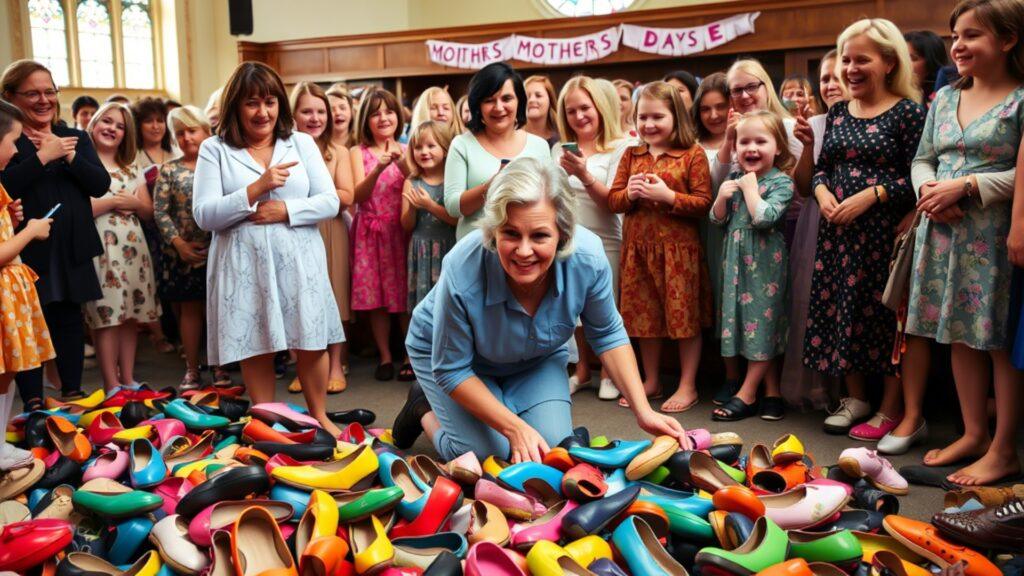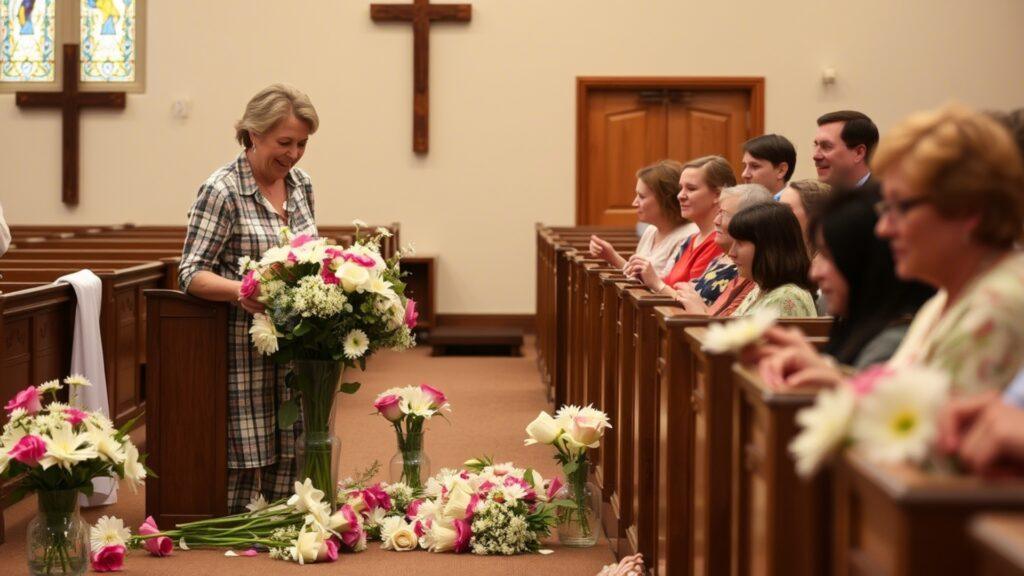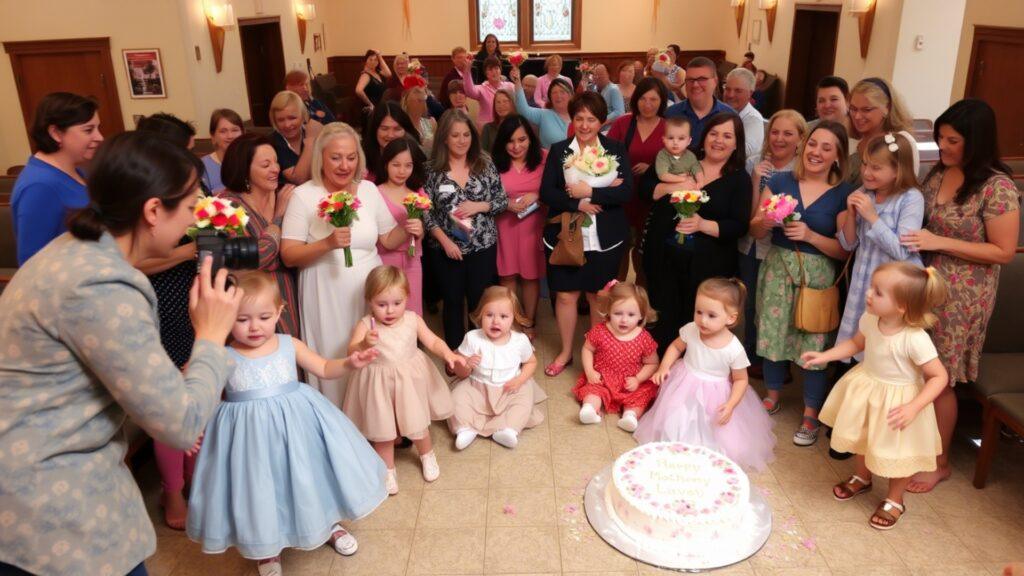Laughter is a gift from God—and mothers are often the unsung comedians of the household, especially when it comes to short funny Mother’s Day stories for church! After all, a good chuckle is an essential part of celebrating the joyful, loving nature of moms.
Alternate one-liner: ‘Why did the mother broom get promoted? Because she swept the children off their feet!’
Mother’s Day programs often center on hymns, heartfelt testimonials, and sacred readings—which are all beautiful.
Yet amid tear-jerkers and solemn reflections, there’s an overlooked spiritual discipline: joyful laughter.
When we insert a dash of lighthearted humor into Mother’s Day worship or programming, we not only break the ice but plant seeds of gospel delight in hearts of every age.
This article equips church leaders—pastors, Sunday School teachers, small-group coordinators, and ministry volunteers—with 7–10 brief, clean, and funny anecdotes tailored for Mother’s Day, plus practical guidance on delivery, inclusivity, and reflection.
Short Funny Mother’s Day Stories for Church
Looking for a way to add some laughter to your Mother’s Day service? These short, funny Mother’s Day stories for church will bring smiles, warm hearts, and a little extra joy to your celebration!
The Case of the Glitter Cupcakes

The week before Mother’s Day, Emma had an idea. She wanted to surprise her Sunday School class. She decided to bake cupcakes. She ran to her mom. “Let’s make sparkly cupcakes,” she said.
Her mom smiled and nodded. “Okay,” she said. “But let’s keep it simple.”
They gathered ingredients. Flour, sugar, eggs, baking powder, and butter. They measured everything carefully. The kitchen smelled warm and sweet. Emma cracked the eggs. Her mom stirred the batter. Emma tasted a bit. It was vanilla heaven.
They filled the cupcake liners half full. They slid the tray into the oven. Emma set the timer. They washed their hands. They waited.
Ding! The timer rang. The cupcakes were golden. Emma and her mom cheered. They let them cool on a rack.
Next came the frosting. Her mom mixed butter, sugar, and a splash of milk. Pink frosting formed in the bowl. Emma’s eyes lit up. “Now the best part,” she said.
Her mom handed her a jar of edible glitter. “Just a sprinkle,” she warned. Emma lifted the lid. She shook a pinch onto one cupcake. It sparkled in the light.
“It looks like a star,” Emma said. She did it again. And again. Soon, she had added more than a sprinkle. She had emptied half the jar.
Her mom raised an eyebrow. “That is a lot of glitter,” she said softly. Emma just grinned.
“I love it,” Emma replied.
Her mom tapped a finger on her chin. She shrugged. “Well, it is your surprise.”
They packed the cupcakes into a box. Emma balanced it on her lap in the car. She bounced with excitement all the way to church.
Sunday morning arrived. The sun shone bright. Mom and Emma walked into the building. Emma carried the glitter cupcakes. She felt a thrill in her chest.
In Sunday School, the children sat on colorful mats. Emma placed the cupcakes on a small table. The kids leaned forward. They cheered.
“Cupcakes!” they shouted.
Emma opened the box. Glitter jumped out. The cupcakes sparkled like jewels. The children grabbed one each. They bit into the soft cake.
Instantly, the children glowed. Glitter stuck to their cheeks. Glitter dusted their hair. Glitter covered their hands.
Emma giggled. “They look like disco stars,” she whispered to her mom.
Her mom laughed quietly. “I hope this ends well,” she said.
The children ran out to show the other classes. Glitter flew across the floor. It clung to shoes and hymnals. It even stuck to the walls.
By the time the service began, the entire church was shining. Light bounced off every surface. The stained-glass windows glowed. The hymnals twinkled.
Pastor John walked to the pulpit. He paused and looked around. His robe glittered. His hair caught tiny sparkles.
He cleared his throat. “Well,” he said, “this is a Mother’s Day service like no other.”
The congregation laughed softly. Pastor John smiled. He shook a bit of glitter off his collar.
Emma and her mom found seats near the front. They sat side by side. A few stray sparkles floated down and landed on Emma’s lap.
Emma looked at her mom. “Mom,” she whispered, “I think you have a halo.”
Her mom glanced down. She touched a sparkle on her dress. She smiled. “Maybe,” she said.
Pastor John continued with his sermon. He spoke about light and hope. He said that each of us can shine for God. He pointed to the glitter all around.
“Sometimes,” he said, “God gives us little sparks to remind us of His love. Today, we have glitter.”
The congregation nodded and chuckled. They wiped specks of glitter from their notes. They sang hymns that felt extra bright.
After the service, people lined up to leave. They shook hands. They hugged. They brushed off glitter as they went.
Many stopped Emma and her mom. “Thank you for the sparkle,” one woman said. “This brightened my day,” another added.
A little boy ran up. He held a handful of glitter. “Look!” he said. “I’m sparkling too!”
Emma ruffled his hair. “That’s the point,” she said with a grin.
Back at home, Emma and her mom sorted through the leftover glitter. They swept the kitchen floor. They wiped the table. It took a long time.
Emma’s mom paused and looked at the empty jar. She smiled. “You know,” she said, “that sparkle reminded everyone of light.”
Emma nodded. “I wanted to share joy,” she said softly.
Her mom hugged her. “You did that,” she whispered.
That night, Emma wrote in her journal. She drew a cupcake with glitter all over it. She wrote: “Tiny sparks can make big hearts shine.”
The next day, Emma’s mom found a bit of glitter on her car seat. She tipped her head. A spark caught the morning sun. She touched it and smiled.
At breakfast, Emma poured cereal for her mom. She sprinkled a few blueberries on top. “No glitter today,” she said.
Her mom laughed. “That’s okay,” she said. “But a little sparkle now and then is nice.”
Emma grinned. She hugged her mom. They both agreed that some sparkle makes ordinary life feel magical.
And from that day on, every time they saw glitter, they remembered how a simple cupcake had turned their church into a shining place of joy.
Mom’s Multitasking Mishap

Sarah’s mom was always busy. She cooked breakfast while chatting on the phone. She folded laundry while helping Sarah with homework. She even stirred soup while listening to the news. Everyone said she was a superhero.
When the church invited her to speak at the Mother’s Day potluck, she agreed without hesitation. She loved sharing about faith. She also loved knitting. That morning, she woke before dawn. She brewed her coffee and read her notes. Then she picked up her knitting needles and yarn.
By the time the hall doors opened, she had already cast on forty stitches of a baby blanket. It was nearly done. She carried the half-finished blanket in one hand and her sermon notes in the other. In the kitchen, she slipped in to grab a plate of fruit. She greeted Mrs. Lee and Mrs. Carter with a quick hug.
The potluck tables gleamed with casseroles and pies. The air smelled of cinnamon rolls and roasted chicken. Sarah’s mom set her coffee down and smiled at the crowd. She loved how the church family came together. She looked at the clock. It was time.
She walked to the front of the hall, yarn bag dangling at her side. She tapped the microphone. “Good morning, everyone,” she said. Her voice was steady. She held up her knitting. “Today, I want to talk about quiet strength.” She paused. “And I want to finish this blanket by the end of my talk.”
The congregation laughed softly. She placed the blanket on her lap. She began to speak about the strength it takes to love quietly. She reminded them of Mary, Jesus’s mother, and her steady trust in God. She tied each point to a stitch.
Needle in hand, she knitted while she spoke. Her needles clicked. She added rows of blue and white. The blanket grew. She moved smoothly from point to point, stitch to stitch.
Halfway through her message, a needle snapped. The metal tip flew across the pulpit. Yarn slipped from her fingers. It bounced once, then twice, and landed on the floor. A long strand trailed behind it, tangled in the microphone cord.
For a moment, she stared at the mess. The congregation gasped. The laughter stopped. Children blinked. Sarah felt her heart pound.
Then her mom smiled. She looked at the broken needle. She picked up the yarn and the pieces. She held them up. “Even our best efforts can break,” she said. Her voice was calm and kind. “But God’s grace picks up the pieces.”
The room relaxed. People nodded. Some faced palms to hide their smiles. She set the broken knitting aside and reached for her notes. She spoke about finding strength in weakness. She told of how Jesus mended broken hearts.
When she finished, the hall burst into applause. Sarah hurried to the front and hugged her mom. “I’m proud of you,” she whispered. Her mom kissed her cheek. “Thank you for loving me, even on messy days.”
Afterward, tables cleared. The church family lined up to thank her. Several asked for the knitting pattern. A few marveled at how she kept speaking without her blanket. One older lady said, “Your words stitched my heart together today.”
Sarah’s mom gathered her things. She tucked the broken needle and the half-finished blanket into her bag. She smiled at her daughter. “Next time,” she said, “I’ll leave the knitting at home.”
That afternoon, Sarah and her mom sat at the kitchen table. They spread the blanket across their laps. The broken needle lay in a box beside them. Her mom picked up fresh yarn and two new needles.
“Let’s finish it together,” Sarah said. She threaded the yarn through the needle. They knitted side by side. Each stitch felt like a prayer. With every loop, they remembered how grace carries them through their brokenness.
By evening, the blanket was complete. It was soft and warm, with a small, extra fringe where the yarn had snapped. To Sarah, that fringe was perfect. It showed that beauty can come from mistakes.
Sarah’s mom draped the blanket over her shoulders. She wrapped it around her daughter’s shoulders, too. “Thank you for helping me,” she said.
“I learned something today,” Sarah said. “Even superheroes need help sometimes.”
Her mom nodded. She held Sarah’s hand. “We all do.”
That night, as Sarah fell asleep under the blanket, she felt safe. She thought of her mom’s words: God’s grace picks up the pieces. She drifted off, knowing that no matter how many needles break, love and grace will always finish the work.
The Great Shoe Hunt

The church was buzzing with excitement. It was the Saturday before Mother’s Day. Pastor’s wife, Diane, had a surprise planned. She called it the “Great Shoe Hunt.”
She set a table in the fellowship hall. On it were dozen pairs of women’s shoes. High heels. Flats. Sandals. Even a pair of fuzzy slippers. Each pair was numbered. Each pair held a secret prize.
At the back of the hall, Diane posted a sign. It read:
“Find the Shoe. Win the Treat!”
On Sunday morning, church-goers arrived early. Mothers and grandmothers, aunts and friends gathered. They sipped coffee and greeted one another. Children squealed with delight. Everything felt happy and bright.
Pastor Mark stood beside the shoe table. He wore a wide grin. “Ready for some fun?” he asked. The crowd cheered.
Diane stepped forward. “Ladies,” she said, “today we celebrate you. Each one of these shoes hides a small gift. Find your pair, and claim your prize.” She held up a chocolate bar. Then she revealed gift cards, bookmarks, prayer journals, and small tokens.
Murmurs of excitement filled the room. Mothers looked at the shoes. Some laughed. Some exchanged curious glances. A few tapped their feet, testing comfort. The hunt was on.
Mrs. Jenkins, a spry eighty-year-old, stepped up first. She wore bright red flats. She scanned the table. She sighed. “So many choices,” she said. She picked shoe number 5, a navy pump. Inside, she found a bookmark that read: “Her children rise and call her blessed.” She smiled and tucked it into her bible.
Next, young mom Beth joined in. She held twin toddlers by the hands. They wobbled around her legs. Beth picked a pair of sparkly sandals. Inside, she found a small jar of homemade jam. She laughed. The twins clapped their hands.
Across the table, Deacon Riley tried on a pair of silver ballet flats. He winked at his wife, Clara. She rolled her eyes and teased him. “Those don’t match your suit,” she said. He shrugged. Inside the shoe, he found a gift card for coffee. “Perfect for Sunday mornings,” Clara said.
Meanwhile, teens from the youth group cheered on their moms. One girl, Anna, selected bright purple slingbacks. She found a neatly folded note that read: “Thank you for your prayers.” She hugged her mom tight.
Some mothers held two pairs at once. They couldn’t choose. Diane chuckled. “Just one pair per guest,” she reminded them. Slowly, everyone found a shoe that fit—at least as an excuse to open the surprise.
By the time the service bell rang, nearly all shoes were claimed. The hall looked a little bare. The prizes were spread out on tables by the exit. People moved toward the sanctuary in pairs and small groups.
Inside, the pews filled quickly. The choir sang “Great Is Thy Faithfulness.” Light streamed through the stained-glass windows. The morning felt holy and warm.
Pastor Mark began the service. He paused and smiled at his wife. Then he spoke about motherhood. He spoke of strength. He spoke of grace. He spoke of love that shapes lives.
Midway through his sermon, he paused. He said, “I’d like to see a show of shoes.” Heads turned. Women laughed and looked down. Some wiggled their toes.
“Please stand if you found a gift in your shoe today,” he said.
Nearly every mother rose. Shoes of all colors and styles filled the aisle. The congregation applauded. Children cheered. Men rose to their feet. The hall echoed with joy.
Pastor Mark raised his hands. “This is what it looks like when community celebrates mothers,” he said. “Each shoe fits a story. Each gift holds a blessing. Thank you for being you.”
The service ended with a prayer. Diane led the prayer. She thanked God for mothers. She thanked God for families. She thanked God for surprises that bring smiles.
After the final hymn, people filed out. They stopped by the prize tables. They picked up jam jars, bookmarks, and journal cards. They hugged Diane and Pastor Mark. They shared stories of their shoe hunt finds.
Mrs. Jenkins showed off her bookmark again. Beth asked for jam recipes. Clara and Riley planned a coffee date. Anna read her note aloud to her mom. Laughter and chatter filled the foyer.
Some children tried on the empty shoes. They said, “Look, I’m a grown-up!” Adults laughed and snapped pictures. A father carried his daughter as she twirled in kitten heels. Everyone felt lighthearted.
Diane watched from the doorway. She saw the joy in every face. She felt her heart swell. Her plan had worked. The Great Shoe Hunt had honored mothers in a fun, simple way.
Later that afternoon, Diane wrote in her journal:
“Today, simple shoes brought simple smiles.
Small surprises can lift heavy hearts.
When we celebrate one another, we celebrate God’s love.”
In the weeks that followed, church members talked about the event. They mentioned it in small groups. They shared photos on social media. They asked Diane, “Will you do it again?”
She laughed and said, “Perhaps next year, we’ll hunt for books instead of shoes.” The idea sparked new excitement.
For now, the shoes were put away. The ribbons and tags stored carefully. But the memory stayed alive. Every time a mother opened her Bible to that bookmark, she smiled. Every time someone poured strawberry jam on toast, they remembered the laughter. Every time coffee warmed their hands, they felt the Deacon’s joke.
And each time the congregation met, they whispered quietly: “Remember the day we hunted for shoes?”
They did. And they would, for years to come. The Great Shoe Hunt had become more than a game. It was a story of community, love, and the joy of celebrating mothers—one shoe at a time.
The Singing Surprise

The week before Mother’s Day, the choir director had an idea. She wanted to honor the moms in a special way. She called all the children in the choir after practice. She handed each child a slip of paper. On each slip was one line from “Amazing Grace.”
“Learn your line by next Sunday,” she said. “Don’t tell your mom.” The children looked at each other with wide eyes. Some grinned. Some giggled. None of them knew what the director had planned.
That Sunday morning, the sanctuary was filled with families. The air smelled like fresh flowers. The children sat in a row at the front. Their mothers sat in the pews just behind them. No one guessed what would happen.
Pastor Lee welcomed everyone. He spoke for a few minutes. Then he invited the choir up. The children stood straight and took a deep breath. The organist began to play the familiar tune.
One by one, the children opened their mouths. Each child sang only his or her single line. The result sounded like a puzzle. “Amazing grace,” said Emma. “how sweet the sound,” said Jacob. “That saved a wretch,” said Lily.
A hush fell over the crowd. People looked around, puzzled. Some leaned forward, trying to catch the next words. The lines came out of order. At times, the melody stalled. Other times, it skipped ahead.
Mothers covered their mouths to hide smiles. Some tapped feet to keep time. A few nodded as if in prayer. One grandmother whispered, “What on earth?” to her friend.
Then the organist paused. The choir director stepped forward. She pointed to Emma. “Now,” she said softly. Emma sang her line again. Then Jacob took his turn. One by one, the children sang their lines in the right order.
When the final child sang, “Was blind, but now I see,” the congregation let out a small cheer. The organist played a gentle flourish. The children smiled at each other. Their mothers wiped tears from their eyes.
Pastor Lee rose from his chair. He looked down at the children. “Thank you,” he said. “That was beautiful.” He turned to the crowd. “On this Mother’s Day, our children reminded us of God’s grace. They did it in their own way.”
After the service, many mothers came to the front. They hugged the children. They kissed their cheeks. They laughed and cried at the same time. One mother held her daughter tight. “That was the sweetest surprise,” she said.
The choir director watched the scene. She felt a warm glow in her chest. Her plan had worked. She had given the mothers a moment to remember. She had woven laughter and love into a hymn.
Later that afternoon, the church hall buzzed with talk. Parents shared their favorite parts of the surprise. The children swapped stories about their own nerves. “I thought I would forget my line,” said Sam. “But then I saw Mom smiling,” said Grace.
In the days that followed, “The Singing Surprise” became a favorite memory. The choir director heard from several moms. They said they played the recording over and over. They said it made them feel treasured.
At the next rehearsal, the children practiced with extra enthusiasm. They still talked about the secret lines. But they also looked forward to the next idea from the choir director.
The mothers kept talking too. They spoke about grace. They spoke about surprises. They spoke about the joy of simple moments. They spoke about the power of a child’s song.
In her office, the choir director wrote a note. It read, “Thank you to the brave singers. Thank you to the patient mothers. Thank you to God, whose grace is always ready to surprise us.” She pinned it to the bulletin board.
Months later, a visitor heard the story. She asked if she could join the choir. She said she wanted to be part of something so full of heart. The director smiled and said, “We’d be honored.”
And so, the tradition grew. Each Mother’s Day, the children learned a different hymn in secret. Each year, they surprised the mothers again. Each year, laughter and tears mixed in the pews.
Through it all, the message stayed the same. God’s grace is amazing. It is sweeter than any melody. It can come through a child’s voice. It can come in unexpected order. It can fill a room with wonder.
And every Mother’s Day, the church remembered. It remembered the day when mixed-up lyrics became perfect harmony. It remembered how simple acts of love can shine brightest of all.
That is the story of “The Singing Surprise.” May it remind us all that grace can sing even when we feel out of tune.
The Wardrobe Warning

Mom had been clear about the dress. “Don’t touch it,” she said. “It’s my special Mother’s Day dress.”
Sarah and Jake heard her. They nodded and agreed. But when Mom wasn’t looking, curiosity got the better of them.
That Saturday morning, Mom laid the dress on her bed. It was pale blue with lace at the collar and tiny pearls at the cuffs. It was the nicest thing she owned. She smiled as she smoothed the fabric. “This will be perfect for church,” she said.
She left the room to make coffee. Sarah peeked in first. The lace looked soft. The pearls sparkled in the sunlight. She reached out and touched a cuff. It felt cool and smooth.
Jake crept in next. He thought it looked like a superhero costume. “I want to try it on,” he whispered.
Sarah shook her head. “Mom said not to touch it.”
Jake shrugged and slipped one arm into the sleeve. The fabric slid up his arm. He pulled the dress over his head. It hung down to his knees. He looked at himself in the mirror.
“It’s amazing,” he said.
Sarah joined him. She ran her fingers over the lace and pearls. “We should leave it alone,” she said. But when she tried on the dress, she couldn’t help touching the lace.
Just then, they heard footsteps in the hallway. They froze. The door opened. Their cat, Whiskers, darted into the room and leapt onto the bed. The dress shifted. Pearls scattered across the floor like tiny moonbeams.
Whiskers batted at one pearl, sending it skittering under the dresser. Sarah gasped. Jake dropped the dress and darted for the hall.
They closed the door behind them, hearts pounding. They heard Mom call, “Kids, breakfast is ready!”
At the table, Mom served pancakes and fruit. She asked, “Did either of you see my pearls?”
Sarah and Jake exchanged nervous glances. “No,” they said in unison.
Mom frowned. “I was looking for them this morning,” she said. “They were on my dresser. Now they’re gone.”
Sarah forced a smile, but her stomach twisted. Jake pushed his pancakes around his plate. Neither dared speak.
After breakfast, Mom left for church early. She held the dress in her hands and examined it in the mirror. “How did I lose so many pearls?” she wondered aloud.
Sarah and Jake sat on the couch, each feeling heavy with guilt. They wanted to tell the truth, but they were afraid.
Finally, Sarah stood. “Mom?” she began.
Mom turned. “Yes, honey?”
Sarah’s voice trembled. “We…we saw Whiskers in your room.”
Mom raised an eyebrow. “Go on.”
“He knocked pearls off the dress,” Sarah said. “Jake and I tried to pick them up, and we…we touched your dress.”
Mom’s face softened. She walked over and knelt beside them. “Thank you for telling me,” she said.
Jake looked down. “We’re sorry,” he whispered.
Mom hugged them both. “It’s okay,” she said. “I should have been clearer about why the dress mattered.”
They all stood and went to the bedroom together. Mom picked up the pearls on the floor. Some were missing. A few lay under the dresser where Whiskers had batted them. The children retrieved them.
Mom laid the dress out again and counted the pearls. “I think we found them all,” she said.
Sarah peered at the lace. “It still looks perfect,” she said.
Mom smiled and smoothed the fabric. “Let’s get ready for church,” she said.
At church, Mom changed into her pale blue dress. Sarah and Jake watched from the pew, filled with relief.
Later, Mom stood at the pulpit to lead the Mother’s Day service. Her dress shone softly in the morning light. She looked calm and confident.
She began her message: “Today, I want to talk about God’s work in our lives. Sometimes, we think small things don’t matter. We rush past the little details and forget they can have great meaning.”
Sarah and Jake glanced at each other. They thought of the pearls. They thought of the dress. They felt a quiet warmth in their hearts.
Mom continued, “My children touched this dress because they were curious. They didn’t understand its value until they saw the pearls scatter. It reminded me of how we sometimes handle our own blessings—carelessly, without gratitude.”
She paused and looked at her children. “But grace is bigger than mistakes. It reaches in and gathers every lost piece, just like my children helped me find these pearls.”
The congregation nodded and smiled. Some wiped their eyes.
After the service, people stopped to thank Mom. They said her message was powerful. They said they would remember the story of the pearls and the dress.
As they walked to the car, Sarah slipped her hand into Mom’s. “I’m sorry for touching your dress,” she said softly.
Mom squeezed her hand. “Thank you for helping me,” she replied. “You taught me something important today.”
Jake grinned. “And next Mother’s Day, I’ll wear my own superhero cape.”
They all laughed. Mom hugged them both.
On the drive home, Sarah and Jake asked questions about God’s grace and forgiveness. Mom answered each one patiently.
That evening, they set the pearls back into a small box on Mom’s dresser. They laid the dress on a hanger, with a note that said, “No touching—please.”
But more than that, they wrote: “Thank you for finding the pearls of grace.”
From that day on, whenever they saw the dress, they remembered the lesson it held: that every little thing matters, and that love can gather every lost piece.
The Flower Arrangement Fiasco

The youth group met early in the church hall. It was the Saturday before Mother’s Day. They planned to make flower arrangements for all the mothers in the congregation. Tables were set up with vases, scissors, ribbons, and buckets of flowers. The air smelled of roses, lilies, and fresh greenery.
Carla was in charge of supplies. She lined up vases in neat rows. Joseph organized scissors and ribbon. Mia sorted flowers by color into buckets. Everyone was excited. They talked about surprising the moms with beautiful bouquets.
At nine o’clock, the work began. Sarah grabbed a handful of daisies. She sliced the stems at an angle and dropped them into a vase. Carlos cut lavender and added it, too. The flowers looked pretty. But then Emma stood up too quickly and knocked over her vase. Water spilled across the table and dripped onto the floor. The daisies floated in a little pool.
“Oh no,” Emma said. She grabbed a towel and mopped up the mess. Carla brought a replacement vase. “Let’s be more careful,” she said kindly.
Meanwhile, Jason tried to arrange roses with eucalyptus. He twisted a ribbon around the bouquet. But the ribbon got stuck on a rose thorn. He tugged, and the stem snapped. The rose tumbled to the floor with a soft thud. Jason frowned. He picked up the rose, trimmed the stem, and whispered, “Sorry, little buddy.” Then he tried again.
Across the room, Lily and Mark were decorating a centerpiece. They wove ribbon through the stems of carnations. It looked elegant. Then Mark sneezed. The ribbon slipped, and the carnations scattered like confetti. Lily laughed. “Bless you,” she said. Mark shrugged. “I guess these flowers needed a fresh start.”
By ten o’clock, the table looked messy. Petals covered the white tablecloth. A stray sunflower lay half-hidden under a chair. More than one vase teetered on the edge. Someone tripped over an empty bucket and spilled a handful of rose petals. The cleanup seemed endless.
Just then, Mrs. Thompson, the youth pastor, walked in. She paused at the door, blinked, and smiled. “Looks like you’ve created a petal carpet,” she said. The students giggled. Mrs. Thompson smiled warmly. “And these flowers will all find a home tomorrow. Don’t worry.”
The youth group kept working. They washed petals off the floor and refilled buckets. They trimmed stems and rearranged blooms. Carla tied ribbons on each vase. Joseph labeled them with “Happy Mother’s Day” tags. Mia fixed crooked stems. Together, they transformed the chaos into more polished arrangements.
Around noon, one rose ended up in the goldfish bowl. The fish swam around the stem like a playful dance. Mia noticed and gently removed the rose. A small cheer went up. It felt like a little victory in a day full of slips and spills.
After hours of work, the final bouquets were ready. They varied in style. Some were neat and compact. Others were loose and wild. A few had extra berries or fern fronds. No two looked the same. But all of them shone with color and life.
The next morning, the youth group set the arrangements on a table in the foyer. Mothers arrived for worship service and gasped at the sight. The bouquets glowed in the early light. Each mother picked one up and smiled. Some sniffed the fragrance. Some smoothed a ribbon. Every woman carried a gift.
During the service, Pastor Allen praised the youth group. He said, “These flowers remind us that beauty often comes from unexpected places. Even when things go wrong, God can turn a mess into something wonderful.” He pointed to the table, and the congregation nodded.
After the service, the youth group received hugs from mothers. Mrs. Jenkins said, “Thank you for these. They are perfect.” Mrs. Carter added, “I love the wild purple flowers in mine.” Even the pastor’s wife, who was usually reserved, gave each student a high-five.
That afternoon, the youth leaders cleaned up. They stacked empty vases and folded the tablecloth. As they worked, Mrs. Thompson gathered them. She held up a wilted petal. “Do you see this?” she asked. The students looked puzzled.
“This petal was once part of a mess,” she said softly. “But today, it brought joy to someone’s heart. That is the power of service. Mistakes and all, your effort made a difference.”
The students smiled and nodded. They felt proud, despite the spills and broken stems. They had learned that even a messy day could bloom into something beautiful.
Later, the youth group gathered for snacks in the fellowship hall. They munched on cookies and lemonade. Emma raised her cup. “To the Flower Arrangement Fiasco!” she said with a grin. Everyone laughed and clinked cups.
“And to next year,” Carla added. “Maybe with fewer spills?”
“Maybe,” Emma laughed. “But I think a little chaos is part of the fun.”
They all agreed. They would remember that Mother’s Day morning for years to come—the day when petals flew, vases toppled, and one rose swam with the fish. It was imperfect, messy, and full of laughter.
Most of all, it was a reminder that love and service bring beauty, no matter how many petals you have to pick up afterward. And that is a lesson worth celebrating.
The Mother’s Day Photo Fiasco

The Wilson family decided to take a special photo for the church bulletin. It was the week before Mother’s Day. They wanted something perfect.
Mom picked out a light blue dress. It was flowy and pretty. Dad ironed his white shirt. The kids wore their Sunday best. Even the dog, Buddy, had a new red bow tie.
They chose the church steps as their backdrop. The stone steps were wide and clean. Flowers framed the entrance. The morning sun made soft shadows.
Dad set up his phone on a small tripod. He opened the camera app. “Okay, everyone,” he said, “let’s make this our best shot ever.”
Mom knelt by the kids. She smiled and brushed hair from her daughter’s face. Little Sophie, age three, grinned back. Big brother Luke, age seven, stood proudly next to his mom. Buddy sat in front, wagging his tail.
Dad pressed the timer button. He dashed around to stand next to Mom. “Ready!” he called out.
They all froze. The camera flashed. But in that moment, Sophie felt queasy. A little spit-up landed on Mom’s shoulder. Sophie looked surprised. Mom looked surprised. The dog barked.
Dad rushed forward. He tried to catch Sophie. Luke ducked behind his mom. Buddy jumped up and grabbed Mom’s hat. It was a pretty straw hat with flowers on the brim. He yanked it right off her head.
Mom laughed. Sophie started to cry. Luke hugged the baby. Dad tripped over a loose hymnal someone had left on the step. He stumbled backward. His foot caught on the edge of the stone, and he fell onto his knees.
Click! The camera fired again. That picture froze the chaos.
Mom picked up her hat. It was now a bit squashed. Sophie sniffled and rubbed her eyes. Dad dusted gravel off his pants. Luke helped him up. Buddy sat proudly with the hat in his mouth.
They tried again. Dad reset the timer. They squeezed together. Mom held Sophie. Luke held Buddy’s collar.
“Smile!” Dad yelled.
They smiled. Buddy looked at the phone. Sophie waved her hand. Luke grinned big. Mom gave her best pose.
The camera flashed a second time. This time it seemed perfect.
Dad checked the photos. The first was a blur of chaos. Sophie’s spit-up, Dad mid-fall, Luke hiding, and Buddy holding Mom’s hat. The second was nice and tidy.
“Which one should we send?” Mom asked.
Dad tapped the screen. “The nice one, of course,” he said.
Mom thought for a moment. She scrolled back to the first photo. She stared at it. Then she smiled.
“This one,” she said, pointing to the messy photo.
Dad raised an eyebrow. “Really?”
Mom nodded. “Yes. It shows real life. It shows grace.”
They sent the messy photo to the church office. They added the caption: “Grace in action.”
On Mother’s Day Sunday, the bulletin arrived in pew racks. The cover photo made people laugh. A hush of giggles ran down the rows. Many heads turned to the Wilson family in the congregation.
Mom blushed. Dad winked at Luke and Sophie. Buddy sat quietly under Benches.
During the service, Pastor Marie pointed to the bulletin cover. “Look at that beautiful image of grace,” she said. “Life is messy, but God’s love holds us together.”
The congregation nodded. Some wiped eyes. Some just smiled.
After the service, church members came up to the Wilsons. “That picture is perfect,” one woman said. “It captures the beauty of family.”
Another man chuckled. “I spit my coffee out when I saw it. But it’s so wonderful.”
Children pointed to the cover. “That’s Sophie!” one child exclaimed. Sophie giggled and hid behind Mom.
Luke beamed. “I helped catch Dad,” he told a neighbor.
Buddy wagged his tail and begged for pets from friendly hands.
Mom felt a warm glow in her heart. She realized that real life was full of surprises. Some moments felt messy. Some felt hard. But all of them were wrapped in love.
Later that day, Mom sat on the couch with Sophie on her lap. Luke climbed next to them. Dad leaned in the doorway. Buddy rested at their feet.
Mom held the bulletin in her hand. She read the caption again: “Grace in action.”
Sophie gurgled happily. Luke hugged his mom. Dad joined the hug. Buddy offered his paw.
Mom whispered, “Thank you for this day.” She looked at her family and smiled.
In the weeks that followed, the church printed extra copies of the bulletin. They shared the photo in the newsletter and on the bulletin board. Visitors often stopped in the foyer. They pointed to the picture.
“This is the kind of grace we all need,” one visitor said.
The photo inspired a sermon series on “Grace in Everyday Life.” Pastor Marie invited families to share their own messy moments. Every story brought laughter and tears.
At the next Mother’s Day celebration, the church once again featured the Wilsons’ photo. But this time, they added a small frame around it. Underneath, the words read: “Perfectly imperfect. Fully loved.”
Mom looked at it every Sunday. She remembered the chaos of that morning. She remembered Sophie’s spit-up, Dad’s fall, Luke’s quick help, and Buddy’s hat theft.
Most of all, she remembered the laughter, the hugs, and the love that held them together.
And she was grateful. Because in that mess, she saw God’s grace shining through.
Why Humor Matters on Mother’s Day?
Why does humor matter on Mother’s Day? Because a good laugh not only lightens the mood but also deepens the connection we share with the moms in our lives. Discover how humor can transform your Mother’s Day celebration!
Breaking the Ice
A warm opening joke or brief anecdote instantly welcomes visitors—especially first-time guests—setting a tone of approachability. In a 2017 Barna Group survey, 68% of churchgoers said that a lighthearted beginning made them feel more comfortable in an unfamiliar service.
Honoring Real-Life Mom Moments
Motherhood is full of everyday comedy: mismatched socks, toddler tantrums, midnight snack raids. Acknowledging these “messy” moments validates mothers’ experiences and reminds everyone that parenting is as joyous as it is sacrificial.
Connecting Across Generations
Humor’s universal language breaks down age barriers. Kids giggle at silly voices, teens appreciate self-deprecating asides, and grandparents smile at nostalgia. Shared laughter nurtures intergenerational unity.
Balancing Reflection with Joy
Introducing a sermon or lesson with humor primes hearts for serious truths. Research in the Journal of Psychology and Theology found that congregations report a 25% higher retention of biblical messages when humor is thoughtfully integrated into teaching.
Evangelistic Value
For non-church families, a service that feels warm, fun, and family-friendly breaks stereotypes of dry, judgmental church culture. A sense of delight opens doors for gospel conversations.
Criteria for Selecting “Short Funny Stories”
Wondering how to choose the perfect short funny stories? Discover the key criteria for selecting tales that bring laughter and warmth to any occasion, while keeping it light-hearted and meaningful!
Brevity
Aim: 2–3 minutes (150–300 words). Too long, and attention drifts; too short, and context is missing.
Appropriateness
Clean, family-friendly content—no off-color language or adult themes. Sensitive to cultural and personal backgrounds.
Relatability
Everyday parenting scenarios: morning routines, mealtime mishaps, school runs, church outings. The more universal the setup, the broader the chuckles.
Humility & Self-Deprecation
Stories told from a first-person “I’ve been there” perspective create connection and authenticity. Avoid “supermom” tropes or jokes that belittle dads or children.
Gentle Scripture Tie-In
One short verse or biblical truth to reinforce the punch line—e.g., joy, peace, or hospitality. The Scripture punctuates the humor, pointing hearts back to God.
Tips for Delivering Funny Stories
Looking to deliver the perfect funny story? Check out these tips for timing, tone, and delivery that will have your audience laughing and engaged, making your story truly unforgettable!
Timing & Pacing
- Pause before the punch line to let anticipation build.
- Keep overall timing under 3 minutes to maintain momentum.
Authenticity & Tone
- Use first-person (“I remember when…”) to own the story.
- Smile and maintain warm eye contact—convey genuine delight.
Vocal Variety & Expressions
- Employ slight inflections for different characters (kids, spouse).
- Add facial expressions to amplify humor.
Keep It Snappy
- Trim extraneous details; focus on setup → payoff.
- Avoid jargon or overly complex language.
Incorporating into Church Context
Want to bring humor into your church service? Learn how to thoughtfully incorporate funny stories into your church context, creating moments of joy and connection without losing the sacred tone.
Sermon Openers & Closers
- Open with a 1-minute anecdote to grab attention.
- Close with a lighthearted remark before transitioning to serious application.
Children’s Moments & Family Worship
- Pair a story with a simple object lesson or craft (e.g., mismatched socks to illustrate God’s perfect plans).
- Invite kids to share their own “mom moments” for interactive humor.
Bulletins & Newsletters
- Feature one story per week leading up to Mother’s Day.
- Include the Scripture tie-in and a mini-reflection prompt (“How have you seen God’s peace in a hectic moment?”).
Mother’s Day Event Segments
- Icebreaker at brunch or luncheon: quick joke round.
- “Open Mic” for moms to share 30-second funny moments.
- Photo-op backdrop: “I survived another… [insert punch line]”—complete the sentence with creative quips.
Addressing Sensitivity & Inclusivity
Humor can unite, but it’s important to be mindful. Discover how to address sensitivity and inclusivity when sharing funny stories, ensuring everyone feels valued and respected while enjoying the laughter.
Acknowledge Pain
Recognize that Mother’s Day can be bittersweet for those grieving loss, infertility, or strained relationships. Offer a quiet prayer station or a moment of solemn reflection.
Avoid Stereotypes
Steer clear of “nagging wife” or “helpless dad” tropes. Celebrate contributions of all family members—fathers, grandparents, siblings.
Celebrate All Mothers
Honor adoptive moms, foster moms, single parents, and “spiritual mothers” (mentors, grandma figures). Include stories or prayers that speak to diverse motherhood experiences.
Cultural Sensitivity
Ensure humor translates across backgrounds. Avoid jokes reliant on specific cultural knowledge or idioms. When in doubt, test anecdotes with a small, varied focus group.
Reflection & Discussion Questions
Want to make your stories more meaningful? Explore these reflection and discussion questions that help deepen understanding, spark conversations, and connect lessons with real-life experiences!
- Which story resonated with you most—and why?
- Can you recall a mom moment that made you laugh and drew you closer to God?
- How might you use humor to share the Gospel or encourage someone today?
- In what ways can laughter serve as a bridge between church and community?
Use these prompts in small-group settings, bulletin inserts, or at the close of your Mother’s Day service.
Conclusion
Joy unlocks hearts; humor reflects God’s delight in His people. As you prepare for Mother’s Day, remember: well-placed laughter isn’t frivolous—it’s a spiritual gift that disarms fear, builds connection, and points us to the One who delights in our gladness.
What to Do Next?
- Adapt these anecdotes to your congregation’s context—or craft new ones from your own family lore.
- Host a “Funny Moms Night,” feature a weekly humor segment in your bulletin, or simply begin your sermon with a brief chuckle.
Final Blessing / Prayer
“Lord, thank You for the gift of laughter and for mothers whose daily joys and jests reveal Your love. May our stories honor You, draw us closer together, and remind us that the Kingdom of God is a place of grace and gladness. In Jesus’ name, Amen.”
Frequently Asked Questions
How do I keep humor respectful in church?
Pre-review jokes for sensitivity; choose universal themes.
How do I adapt anecdotes for multicultural congregations?
Replace cultural specifics with universally relatable settings (e.g., “school drop-off” rather than “suburban carpool”).
How can non-mothers participate in Mother’s Day humor?
Invite them to share funny “parenting proxy” stories—pets, siblings, or classroom adventures.
Mark Richards is the creative mind behind Classica FM, a podcast platform that brings stories, knowledge, and inspiration to listeners of all ages. With a passion for storytelling and a love for diverse topics, he curates engaging content—from kids’ tales to thought-provoking discussions for young adults.



